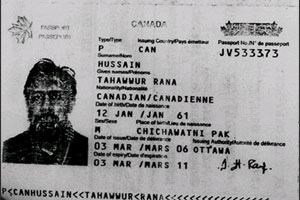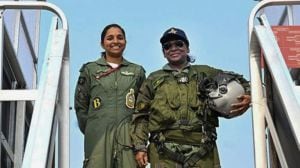Month before extradition verdict, 26/11 attack accused Tahawwur Rana attempted plea bargain
Tahawwur Rana is accused by India of aiding and abetting the reconnaissance carried out by convicted terrorist David Coleman Headley for the 2008 Mumbai terror attacks and participating in the conspiracy for the attack.
 Tahawwur Hussain Rana
Tahawwur Hussain Rana A US court’s decision to approve the extradition of Tahawwur Hussain Rana to India has come a month after the accused in the 26/11 Mumbai terror attacks moved court in the country in an attempt to enter a plea bargain, sources said. The court in April, however, had rejected the request saying it anticipated a ruling to be delivered in the matter within 30 days.
In a motion moved through his lawyer in March, Rana asked for a status conference – a court-ordered meeting between the prosecution and the defence to discuss the case details – and a plea bargain.
Judge Jacqueline Chooljian of the US District Court in the Central District of Los Angeles, California, who delivered the May 16 verdict allowing the US secretary of state to extradite Rana to India, had held the last hearing in the Rana case in June 2021 with the last set of papers related to the case being filed in July that year. The case, despite all arguments concluded, had been hanging fire for almost two years.
Rana’s counsel had moved his application on the basis of a delay in the final resolution of the case.
After the US Secretary of State decides on the matter, Rana’s custody will be handed over to the National Investigation Agency (NIA), which is probing the case. Rana’s trial in India will further help Delhi corner Islamabad on the 26/11 attacks.
It was in 2020 that the US had submitted in the California court that Rana should be cleared for extradition to India as his offences and legal situation fulfil all the criteria for his handover to India as mentioned in the extradition treaty between the two countries.
On September 28, 2020, the State, represented by Christopher D Grigg, chief of the National Security Division of the US Attorney’s Office, and attorney Nicola T Hanna, submitted in the Court for Central District of California that Rana’s prior arguments against his extradition to India “had no merit”.
“In the instant case, the elements necessary for the court to certify Rana’s eligibility for extradition have been met. There is subject matter and personal jurisdiction over Rana. A valid extradition treaty permits extradition for some of the offenses charged in India. And there is probable cause to believe that Rana committed these offenses,” the submission had said.
#WATCH | “The order of the American court extraditing Tahawwur Rana (26/11 Mumbai terror attack accused) is a great victory for India. It is for the first time according to my knowledge, American govt has heavily relied upon Indian investigation agency’s evidence…”: Ujjwal… pic.twitter.com/R8SEvxZoO7
— ANI (@ANI) May 18, 2023
Interestingly though, the US government had submitted that it is not proceeding on some of the charges such as “membership of a terror organisation”, “conspiracy to wage war” and “conspiracy to commit terrorist act” as pressed by India as they do not fulfil the criteria of “dual criminality”. It had, however, said that “the dual-criminality requirement (of the extradition treaty) is met because the remaining charged offenses are punishable in both India and the United States”.
In December 2019, India had applied for Rana’s extradition through the Ministry of External Affairs. In June 2020, US authorities put Rana under detention based on a provisional request for arrest from the NIA. He had then been prematurely released from US federal prison where he was serving a sentence for conspiracy to attack Danish newspaper Jylland Posten’s office in Denmark. In August 2020, the US filed the request for extradition in the designated court. The hearing in the case then began in January 2021.
Rana, a school friend of convicted 26/11 accused David Coleman Headley, is accused by India of aiding and abetting the reconnaissance carried out by Headley for the November 26 Mumbai terror attacks and participating in the conspiracy for the attack. Rana had falsely represented Headley as an employee of his visa facilitation company named Immigration Law Centre and opened an office in Mumbai to give him cover for reconnaissance.
In his prior submissions in court, Rana had opposed his extradition on the ground that he had been acquitted by the California court on charges of abetting the Mumbai terror attacks in 2011 and that since Headley had not been extradited, he could not be extradited either. He also pleaded double jeopardy.
 Tahawwur Rana’s passport (file)
Tahawwur Rana’s passport (file)
The submissions by the US government had rejected these arguments saying the offences in the two countries Rana has been charged with are not identical. “Double jeopardy likewise does not apply” as “extradition proceedings are not criminal proceedings in which the fugitive is entitled to the same rights available during criminal proceedings”. It had also said parallel with Headley cannot be drawn as he had entered a plea bargain.
At the extradition hearing, the court considers the evidence presented on behalf of the requesting country and determines whether the legal requirements for certification, as defined in the relevant treaty, statutes, and case law, have been established. The secretary of state, and not the court, decides whether the fugitive should be surrendered to the requesting country.
“When interpreting an extradition treaty, the extradition magistrate must construe its provisions liberally, in a manner favoring the obligation to surrender fugitives. …The extradition court is not authorized to determine whether the evidence is sufficient to justify conviction …The extradition court need only determine whether there is probable cause to believe that the fugitive committed the offense or offenses for which extradition is sought,” the government had submitted.
Explaining why this “probable cause” was there in the case, the submission had recounted Rana’s role in the Mumbai attacks conspiracy and also cited some evidence of his involvement.
It had pointed out how between June 2006 and November 2008, Headley had travelled to Chicago at least three times, during which he met with Rana and conveyed detailed information about his surveillance activities in Mumbai.
It had said Headley even arranged for Rana to meet one of their co-conspirators (from Pakistan) in Dubai. “…the coconspirator warned Rana not to travel to India due to the upcoming attacks. As a result …Rana did not travel to India,” the submissions had said.
In September 2009, the FBI intercepted a conversation between Rana and Headley where Rana allegedly told Headley that the nine LeT attackers who had been killed during the attacks should be given Pakistan’s highest military award.
“Rana also asked Headley to tell another co-conspirator in Pakistan – a member of LeT and one of the planners of the Mumbai attacks – that Rana thought that he should get a medal “for top class.” When Rana learned that Headley already had conveyed this compliment to their co-conspirator, he was pleased,” the submission has said.
It has also cited another conversation where the two talk about a Styrofoam model of Taj Palace Hotel made by the planners in Pakistan and how Headley thought it was “terrible”, to which Rana responded with laughter.
“In December 2008, Headley shared what he learned from their co-conspirators in Pakistan about the different places that had been attacked. Referring to a 1971 attack on his school in Pakistan, Headley told Rana that he believed he was “even with the Indians now.” In response, Rana said they (the Indian people) deserved it,” the submissions said.
“These facts, and those set forth in the extradition request, establish that Rana was a member of the conspiracy and understood the consequences of his and others’ actions. He understood that he was working with LeT and others committed to terrorism. …Thus, there is probable cause that Rana committed the charged offenses of conspiracy, conspiracy to wage war, conspiracy to commit a terrorist act, participation in the waging of war, the commission of murder, and the commission of a terrorist act,” they added.
A total of 166 people were killed in the 2008 Mumbai terror attacks in which 10 LeT terrorists laid a more than 60-hour siege, attacking and killing people at several locations in the city.







